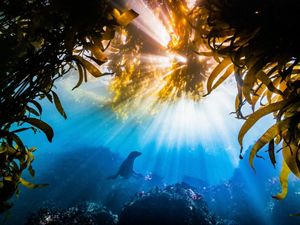Media Statement: UN Biodiversity Conference CBD-COP15 scores historic goal for nature
Deep into extra time, long-awaited Global Biodiversity Framework finally makes it across the line - now the real work begins...
Media Contacts
-
Tom Jennings (U.K.)
Email: tom.jennings@tnc.org -
Angela Campbell (U.S.)
Email: angela.campbell@tnc.org
While the eyes of billions were fixated by events on the soccer field in Qatar – thousands of miles away in Montreal, an even more momentous result was being secured at UN Biodiversity Conference COP15, where years of painstaking negotiations culminated in the adoption of the Kunming-Montreal Global Biodiversity Framework – our shared international roadmap out of the ecological crisis and towards a more nature-positive world – which was finally approved in the early hours of the Canadian morning.
Commenting on this positive outcome from a meeting that was mired in deadlock last week, The Nature Conservancy’s Andrew Deutz – Director of Global Policy, Institutions and Conservation Finance – said:
“If more people grasped the pace, severity and long-term implications of biodiversity loss, the eyes of the world might have been focused on Montreal rather than Qatar over these two weeks.
“Against a backdrop of dramatic ecological declines in the face of human-driven pressures, the world badly needed CBD-COP15 to deliver – and, right at the death, it did just that, scoring a win for people and nature.
“The pandemic may have ultimately delayed China’s plans to host the full COP in Kunming after much perseverance – but it feels fitting that its delegation was still able to get the Global Biodiversity Framework (GBF) across the line.
“Make no mistake: this is an historic result for nature. The Kunming-Montreal Global Biodiversity Framework provides a long-needed international blueprint to guide our collective turnaround of nature’s fortunes within this crucial decade.
“The highlights reel includes the adoption of the 30x30 target to secure the effective conservation of 30% of the world’s lands, seas and inland waters, and the make-or-break area of resource mobilization – put simply, securing the funds necessary to finance our transition towards a more nature-positive world by plugging the ~US$700B annual gap in biodiversity finance and ensuring that all public and private financial flows become nature-positive over time.
“The target within the finalized Framework on corporate disclosure of biodiversity risk also sends a powerful signal to companies that they should adjust their business models and investment strategies towards a nature-positive economy.
“On this note, it was heartening to see such momentum building in Montreal around biodiversity finance via initiatives like the High Ambition Coalition, Leaders’ Pledge for Nature, 10 Point Plan, and Project Finance for Permanence (PFP) movements.
“None of this is to sound downbeat about the breakthrough moment that the Kunming-Montreal Biodiversity Framework represents. At a time of such international flux, we should rightly celebrate the achievement of negotiators and civil society in delivering this agreement – while also recognizing that it represents the end of the beginning, rather than the beginning of the end, of the nature crisis.
“I saw first-hand in Montreal just how much effort negotiators, civil society and NGO allies invested in achieving this breakthrough. To return to World Cup metaphors – it really did feel like a championship game heading into extra time in knife-edge fashion. The big difference is that while Leo Messi and teammates now get to hang up their boots and luxuriate in a hard-fought victory – for the global biodiversity community, the next phase of hard work already beckons: mainstreaming the framework’s architecture into country-level policy that will deliver meaningful progress where it matters most: across the imperilled ecosystems that represent our planet’s collective life-support system.
“The Nature Conservancy stands ready across our global network to support what I hope will be a giant leap forward in humanity’s relationship with the natural world via the landmark Kunming-Montreal Global Biodiversity Framework.”
Elaborating further on the outcome from Montreal, Shaughn McArthur – Associate Director of Government Relations for Nature United – commented:
“In welcoming the world to COP15 in Montreal, Canada stepped up to inspire collaboration towards a Kunming-Montreal Biodiversity Framework that could offer a foundation to governments, civil society, Indigenous communities, and businesses that are committed to a more nature-positive world. This included commitments to Indigenous leadership as a vehicle of reconciliation, and to hold itself legally accountable for tackling biodiversity loss.
“Nature United looks forward to working with Canada to achieve these ambitions, in a way that upholds the spirit of the Framework and offers an example to people, governments and businesses worldwide.”
The full text of the Kunming-Montreal Global Biodiversity Framework can be accessed here.
The Nature Conservancy is a global conservation organization dedicated to conserving the lands and waters on which all life depends. Guided by science, we create innovative, on-the-ground solutions to our world’s toughest challenges so that nature and people can thrive together. We are tackling climate change, conserving lands, waters and oceans at an unprecedented scale, providing food and water sustainably and helping make cities more sustainable. Working in 76 countries and territories—37 by direct conservation impact and 39 through partners—we use a collaborative approach that engages local communities, governments, the private sector, and other partners. To learn more, visit www.nature.org or follow @nature_press on Twitter.



